Sarah Ward's Blog, page 13
December 14, 2016
Christmas Giveaway from Crimepieces
Christmas is fast approaching which means it’s time for my annual Scandi crime giveaway. I’ve been reading lots of Nordic Noir in readiness for March’s judging session of the Petrona Award. I’ll also be moderating some great Scandi panels at the forthcoming Granite Noir in Aberdeen.
I have a selection of this year’s Petrona eligible books to give away this festive season. To enter, all you need to do is sign up to my newsletter by clicking on the snowy image of the books below. The newsletter is sent out quarterly so you won’t get bombarded with e-mails but it includes updates on the Petrona Award and other exclusive book news.
If you already receive my newsletter, simply share my Facebook post or retweet the post. The competition is open to everyone, regardless of where you are geographically. I’ll be selecting the winner at 7pm on Sunday 18th December.
Good luck!


Christmas Giveaway from Crimepieces
Christmas is fast approaching which means it’s time for my annual Scandi crime giveaway. I’ve been reading lots of Nordic Noir in readiness for March’s judging session of the Petrona Award. I’ll also be moderating some great Scandi panels at the forthcoming Granite Noir in Aberdeen.
I have a selection of this year’s Petrona eligible books to give away this festive season. To enter, all you need to do is sign up to my newsletter by clicking on the snowy image of the books below. The newsletter is sent out quarterly so you won’t get bombarded with e-mails but it includes updates on the Petrona Award and other exclusive book news.
If you already receive my newsletter, simply share my Facebook post or retweet the post. The competition is open to everyone, regardless of where you are geographically. I’ll be selecting the winner at 7pm on Sunday 18th December.
Good luck!


December 12, 2016
Review: Rachel Amphlett – Scared to Death
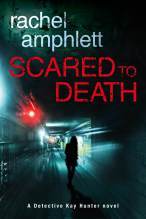 Rachel Amphlett is the author of a series of espionage novels featuring her protagonist Dan Taylor. When I met her at Crimefest, the author told me she was working on a new detective series and Scared to Death is the result. The book opens with the kidnapping of a teenage girl and the desperate attempts by her parents to ensure her safety by paying the ransom demanded. Detective Kay Hunter of the Kent police is called in to deal with the ensuing tragedy and attempts to prevent the killer striking again.
Rachel Amphlett is the author of a series of espionage novels featuring her protagonist Dan Taylor. When I met her at Crimefest, the author told me she was working on a new detective series and Scared to Death is the result. The book opens with the kidnapping of a teenage girl and the desperate attempts by her parents to ensure her safety by paying the ransom demanded. Detective Kay Hunter of the Kent police is called in to deal with the ensuing tragedy and attempts to prevent the killer striking again.
As I follow Rachel on Twitter I can she see she writes in intense bursts and this is strongly reflected in the tone of writing and narrative structure. It makes for a thrilling read. Although I hadn’t read any of her previous books I think this series has great promise. I found myself drawn into the story despite finding the crimes quite grim (this isn’t a criticism!). You get passages with the killer’s point of view. I think they work with this kind of crime novel and it certainly made a creepy read even creepier.
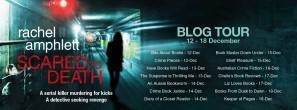 Like other great crime novels, she balances the rather gruesome crime story with glimpses of the personal life of her lead detective. Tension at work with her boss as the result of a previous case are set against her stable home life which is good to see with a female detective.
Like other great crime novels, she balances the rather gruesome crime story with glimpses of the personal life of her lead detective. Tension at work with her boss as the result of a previous case are set against her stable home life which is good to see with a female detective.
There’s plenty of mileage left with the character of Kay Hunter and hopefully Scared to Death is the start of a successful new crime series.


December 9, 2016
Music to Write Books By – J R Lindermuth
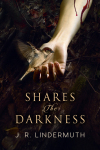 It’s last few weeks of this series where authors share the music they write to. It’s been fascinating over the last couple of months to hear the music choices from authors. Today I have a native of Pennsylvania, J. R. Lindermuth who worked as a newspaper reporter and editor for nearly 40 years. He continues to write a weekly history column for the local newspaper. Since retiring, he has served as librarian of his county historical society where he assists patrons with genealogy and research. He is the author of 15 novels and a non-fiction regional history. His short stories and articles have been published in a variety of magazines. He is a member of International Thriller Writers and is a past vice president of the Short Mystery Fiction Society.
It’s last few weeks of this series where authors share the music they write to. It’s been fascinating over the last couple of months to hear the music choices from authors. Today I have a native of Pennsylvania, J. R. Lindermuth who worked as a newspaper reporter and editor for nearly 40 years. He continues to write a weekly history column for the local newspaper. Since retiring, he has served as librarian of his county historical society where he assists patrons with genealogy and research. He is the author of 15 novels and a non-fiction regional history. His short stories and articles have been published in a variety of magazines. He is a member of International Thriller Writers and is a past vice president of the Short Mystery Fiction Society.
Hi Jack – Do you have particular pieces of music you write to?
Not a particular piece; more a type of music. Symphony Hall is generally tuned in low on my Sirius radio as I write. Unless they play something really discordant I probably won’t change the station. Though, depending on the type of story, there are times when I’ll tune to a blues station or play a CD. Some favorites: Son House, Robert Johnson, Lightnin’ Hopkins, Otis Spann, Muddy Waters, many more.
Has a particular piece of music ever inspired you to write something?
Not directly. A Burning Desire (sixth in the Sticks Hetrick crime series) was partly inspired when I read of an arsonist who had a play list.
I enlisted my son’s help in compiling a list for my character, since he’s more familiar with rock and its derivatives than me. Among the songs selected (not all were used in the book) were Joan Jett’s “I Love Playin’ With Fire;” the Grateful Dead’s “Fire in the City;” Gene Simmons’ “Firestarter;” Blue Oyster Cults’ “Fire of Unknown Origin,” and Glenn Frey’s “The Heat is On.”
Could you recommend any particular pieces of music for a specific mood?
Bach for serenity and joy. Perhaps the French Suite No. 2 or the Italian Concerto. Or Antonio Soler’s Sonata No. 62. Beethoven’s Symphony No. 9 for powerful emotions. Mahler’s Auferstehung for sobriety. Erik Satie’s hauntingly beautiful Gnossienne for a change of pace.
Are there any longer works you can recommend. If you need to write for an hour, for example, is there a particular composer/artist you’d chose.
I’d recommend Bach, perhaps the Goldberg Variations or the Brandenberg Concertos.
What are you working on at the moment?
I’m working on the eighth in the Sticks Hetrick series in which Chief Brubaker’s daughter is accused of murdering her lover. Musical references so far have included classical, rock and country.
Thanks, Jack for taking part in this. Jack’s book links are below. Good luck with your writing.
Book links:
https://www.amazon.com/J.R.-Lindermuth/e/B002BLJIQ8
http://www.barnesandnoble.com/s/lindermuth?_requestid=722276
http://www.simonandschuster.com/search/books/_/N-/Ntt-lindermuth


December 5, 2016
The Return of Poirot: The Monogram Murders & Closed Casket by Sophie Hannah
 I recently interviewed Sophie Hannah at an event in the Old Hall hotel in Buxton. It’s a old-style hotel and perfect for speaking to an author who has taken on the mantle of continuing one of our greatest fictional detectives, Hercule Poirot. I’d already listened to The Monogram Murders on audio book but hadn’t reviewed it on Crimepieces as I was waiting to read the book. When the hardback of the next Poirot novel, Closed Casket, arrived on my doormat it was the perfect opportunity to read both books back-to-back.
I recently interviewed Sophie Hannah at an event in the Old Hall hotel in Buxton. It’s a old-style hotel and perfect for speaking to an author who has taken on the mantle of continuing one of our greatest fictional detectives, Hercule Poirot. I’d already listened to The Monogram Murders on audio book but hadn’t reviewed it on Crimepieces as I was waiting to read the book. When the hardback of the next Poirot novel, Closed Casket, arrived on my doormat it was the perfect opportunity to read both books back-to-back.
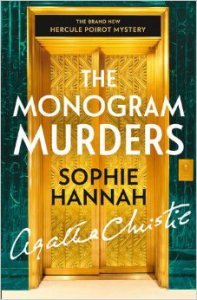 The Monogram Murders begins with a young woman rushing in to a coffee house and revealing to Poirot that she is already dead, or at least will be soon. Later that night three guests in the Bloxham Hotel are murdered and a cufflink placed in each of their mouths, mystifying Scotland Yard detective Edward Catchpool.
The Monogram Murders begins with a young woman rushing in to a coffee house and revealing to Poirot that she is already dead, or at least will be soon. Later that night three guests in the Bloxham Hotel are murdered and a cufflink placed in each of their mouths, mystifying Scotland Yard detective Edward Catchpool.
What follows is a murder mystery using Poirot, Christie’s famous detective but written in Sophie Hannah’s style. The decision to do this is very wise as I think few writers of Hannah’s pedigree would want to imitate the style of another author. The first third of book is slowly paced as we get used to the unusual Catchpool and his morbid fear of the dead. However, when we get to the untangling of the deaths, I found myself mesmerised by the narrative. It’s a devious plot and the extended revelation at the end is pure Poirot.
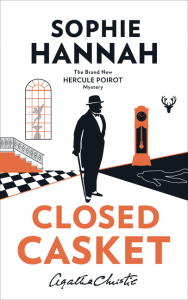 Closed Casket, the second Poirot book by Hannah is interesting in that in some respects it’s clearly a continuation of the style of book we see in The Monogram Murders and, at the same time, the author has subtly changed tack. Lady Athelinda Playford has a gathering at her country house in Ireland and over dinner announces that she has changed her will and cut off her children in favour of a man with only weeks to live. When a murder is committed, both Catchpool and Poirot pursue their own paths to catch the killer.
Closed Casket, the second Poirot book by Hannah is interesting in that in some respects it’s clearly a continuation of the style of book we see in The Monogram Murders and, at the same time, the author has subtly changed tack. Lady Athelinda Playford has a gathering at her country house in Ireland and over dinner announces that she has changed her will and cut off her children in favour of a man with only weeks to live. When a murder is committed, both Catchpool and Poirot pursue their own paths to catch the killer.
Those who have read Hannah’s psychological crime novels will recognise the complex plotting and it’s interesting to see how Catchpool’s character has developed. There’s more of Hannah’s humour in this book and an ingenious solution.
These were interesting books to review. I’ve deliberately not looked at any other commentary on the novels because there are legion of Christie fans each with their own take on the books. I think I read my first Poirot novel at twelve and have enjoyed the numerous film and TV adaptations over the years. Poirot is in safe hands with Hannah and I’ll definitely continue reading the series,


December 2, 2016
Music to Write Books By – Fiona Curnow
 Today on Crimepieces, I have Fiona Curnow. Fiona dropped out of school aged 15, because being the consummate rebel, she hated it. After becoming a single parent she decided to return to education, graduating in 1996 with an honours degree in primary education. As soon as she graduated she packed everything she owned into her Renault 11, including her daughter, two dogs and a cat, and headed off to Estonia to become an international school teacher. After fifteen years of teaching, predominantly in Eastern Europe, she returned to the UK to focus on her writing.
Today on Crimepieces, I have Fiona Curnow. Fiona dropped out of school aged 15, because being the consummate rebel, she hated it. After becoming a single parent she decided to return to education, graduating in 1996 with an honours degree in primary education. As soon as she graduated she packed everything she owned into her Renault 11, including her daughter, two dogs and a cat, and headed off to Estonia to become an international school teacher. After fifteen years of teaching, predominantly in Eastern Europe, she returned to the UK to focus on her writing.
She now lives on the east coast of Scotland with a rescued Ukrainian street mutt, a Scottish black lab and a Portuguese cat who doesn’t like the weather. To Retribution is her first novel.
Hi Fiona – Do you have particular pieces of music you write to?
I have a play-list called ‘study’ which is a huge selection of classical music. Within that there are a few favourites including Chopin’s Opus 28 Prelude No 15 in D flat major, raindrop, for when I want something moody and serious. Bruch’s violin concerto No.1 in G minor is also great for gentle stimulation.
Has a particular piece of music ever inspired you to write something?
Yes. The novel I am working on now had its absolute beginnings in, ‘The Town I Loved So Well’ by The Dubliners. The words put such a strong image in my mind. The contrast between pre and post ‘troubles’ in Ireland, the return to a land destroyed, led me to the idea of a story based on a similar concept but in a fictitious country. Very different themes, politics, but a similar feeling.
I also used Rage Against the Machine’s ‘Killing in the Name’ as the song which kept my female lead, Suze, in ‘To Retribution,’ focussed on what she had to do and why she was doing it.
Could you recommend any particular pieces of music for a specific mood ?
If I want to invoke something sad, super emotional, it would be Tomaso Albinoni’s Adagio in D minor. The way the violin gets higher and higher until you think it can’t go any further…but it does. It’s like the music is breaking your heart. Fabulous, tears to the eyes stuff!
Are there any longer pieces you can recommend. If you need to write for an hour, for example, is there a particular composer/artist you’d chose.
It depends very much on what I’m writing and where I am in that process. I err on the side of classical if I need to concentrate, develop new ideas, Bach’s suite no. 3 or Beethoven’s 7th for floating along with. But if I know where I’m going and what the mood is something to fit the feeling. For example, Brand New’s ‘Daisy’, Pearl Jam’s ‘Ten’, or Blind Melon’s ‘Nico’ are regular go to’s during times of angst.
What are you working on at the moment?
It’s a novel based around a young woman who returns to the country (fictitious) her grandfather fled from as a child. It’s war torn and forgotten by the media (take your pick on current events!). She is on the run from a past she can’t quite make sense of and she has created a new identity for herself in an attempt to hide from an unknown enemy. But her new life is also in jeopardy. Perhaps more so than her old one.
Thanks, Fiona for taking part in the series. Good luck with your writing.


November 30, 2016
Four recent e-book reads: Kevin Wignall, Margot Kinberg, Christina Philippou & Alan M A Friedmann
I’ve recently bought a Kindle Paperwhite to replace the first generation kindle that has lain unused in my desk drawer for years. To be honest, the new version isn’t much different to the old except for the touch screen and the light that I can use to read in bed. It has, however, prompted me to read some authors whose books were either easier to find on kindle or had been sitting on my e-reader for a while.
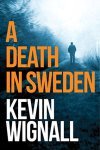 First up was Kevin Wignall whose A Death in Sweden I’d heard great things about. It has a cracking opening chapter: a bus crash where one of the victims, Jaques Fillon, is proved never to have existed despite living in plain sight a small rural community in northern Sweden. A former CIA hitman, Dan Henricks, is asked to uncover Fillon’s real identity. However, former colleagues are being assassinated and Henricks is both hunter and hunted. I have a penchant for well-written spy thrillers and this one definitely fits the bill. Wignall doesn’t fall into the Brits in Scandinavia trap. Descriptions of the landscape serve to push along the narrative not hinder it with needless prose and I enjoyed the taut narrative.
First up was Kevin Wignall whose A Death in Sweden I’d heard great things about. It has a cracking opening chapter: a bus crash where one of the victims, Jaques Fillon, is proved never to have existed despite living in plain sight a small rural community in northern Sweden. A former CIA hitman, Dan Henricks, is asked to uncover Fillon’s real identity. However, former colleagues are being assassinated and Henricks is both hunter and hunted. I have a penchant for well-written spy thrillers and this one definitely fits the bill. Wignall doesn’t fall into the Brits in Scandinavia trap. Descriptions of the landscape serve to push along the narrative not hinder it with needless prose and I enjoyed the taut narrative.
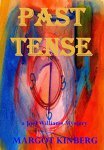 Margot Kinberg is one of the most popular US crime fiction bloggers and her website, Confessions of a Mystery Novelist, is the best around. I reviewed one of earlier books, Publish or Perish, a few years ago and I was delighted to see that she had a new novel out. Past Tense once more takes place at Tilton University where former detective turned professor, Joel Williams, investigates the discovery of bones on a construction site. Kinberg’s books are examples of how American mysteries don’t have to fit in the ‘noir’ or ‘cosy’ category. Past Tense is an excellent tale with a disturbing crime at its core and a perfect winter read.
Margot Kinberg is one of the most popular US crime fiction bloggers and her website, Confessions of a Mystery Novelist, is the best around. I reviewed one of earlier books, Publish or Perish, a few years ago and I was delighted to see that she had a new novel out. Past Tense once more takes place at Tilton University where former detective turned professor, Joel Williams, investigates the discovery of bones on a construction site. Kinberg’s books are examples of how American mysteries don’t have to fit in the ‘noir’ or ‘cosy’ category. Past Tense is an excellent tale with a disturbing crime at its core and a perfect winter read.
 Christina Philippou is a debut author whose book, Lost in Static, has an interesting premise. There are four different versions of one story. Who is telling the truth? Philppou has an strong writing style. To differentiate the characters she switches from first person to third and from present tense to past. The subject matter is hard-hitting and like Doug Johnstone’s recent novel, I enjoyed the protagonists being younger than you normally read. Phlippou is a talented writer who has a promising career ahead.
Christina Philippou is a debut author whose book, Lost in Static, has an interesting premise. There are four different versions of one story. Who is telling the truth? Philppou has an strong writing style. To differentiate the characters she switches from first person to third and from present tense to past. The subject matter is hard-hitting and like Doug Johnstone’s recent novel, I enjoyed the protagonists being younger than you normally read. Phlippou is a talented writer who has a promising career ahead.
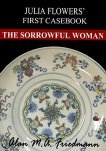 ‘Cosy’ is a term that comes with a variety of connotations but they can be great fun to read. Alan MA Friedman (the nom de plume of a writing duo) describe their debut novel, The Sorrowful Woman, as ‘Tartan Blanc’. Julia Flowers is an Oriental antique specialist who investigates the death of a former diplomat. The tone of the book is light-hearted and humorous and there’s good balance between the professional detective, Inspector Bland and Julia, the enthusiastic amateur. There’s a strong Scottish sense of place to the setting and The Sorrowful Woman is an enjoyable start to what I’m sure will be a great new series.
‘Cosy’ is a term that comes with a variety of connotations but they can be great fun to read. Alan MA Friedman (the nom de plume of a writing duo) describe their debut novel, The Sorrowful Woman, as ‘Tartan Blanc’. Julia Flowers is an Oriental antique specialist who investigates the death of a former diplomat. The tone of the book is light-hearted and humorous and there’s good balance between the professional detective, Inspector Bland and Julia, the enthusiastic amateur. There’s a strong Scottish sense of place to the setting and The Sorrowful Woman is an enjoyable start to what I’m sure will be a great new series.
Can you recommend any e-books for my next kindle reads?


November 25, 2016
Music To Write Books By – Christopher Fowler
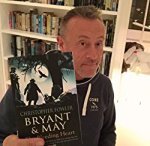 Today on Crimepieces I have Christopher Fowler. Chris is the multi award-winning author of many novels and short story collections, and the author of the Bryant & May mysteries which I love. The latest book in the series, London’s Glory, is a collection of short stories that I can’t wait to read. His first bestseller was Roofworld and subsequent novels include Spanky, Disturbia, Psychoville and Calabash.
Today on Crimepieces I have Christopher Fowler. Chris is the multi award-winning author of many novels and short story collections, and the author of the Bryant & May mysteries which I love. The latest book in the series, London’s Glory, is a collection of short stories that I can’t wait to read. His first bestseller was Roofworld and subsequent novels include Spanky, Disturbia, Psychoville and Calabash.
Hi Chris. Thanks for taking part in this series. Do you have particular pieces of music you write to?
I always write with music playing, so long as there are no vocals. My experience is the reverse of most writers; when I was a teenager I loved classical music, but later I came to love EDM and modern pieces. However, I’ve always found that soundtracks can provide the perfect atmosphere in which to create. For many years I worked in the film industry and was often given soundtrack recordings by directors, many of which didn’t make the final cut. Soundtrack music is created to enhance the emotion of visuals and is an ideal accompaniment to writing. I have no taste boundaries, and will happily play demanding minimalist pieces next to cheesy sixties scores; music is unapologetically personal, and no-one should have control over your tastes!
I went through a phase of writing to Michael Nyman scores, particularly the Handel-like ‘The Draughtsman’s Contract’ and ‘Drowning by Numbers’ (based on Mozart phrases), plus a limited edition album of his called ‘Sublime’. His score for ‘Prospero’s Books’, Greenaway’s version of ‘The Tempest’, also conjures images.
Minimalists Wim Mertens and Max Richter heavily feature on my writing playlists. Phillip Glass is a little too intrusive to write to.
Has a particular piece of music ever inspired you to write something?
Mark Isham’s score for ‘Crash’ inspired a number of my short stories. Richard Rodney Bennett’s score for ‘Gormenghast’ definitely had an effect on a new novel that’ll be out next year called ‘The Foot on the Crown’. Composers contacted me directly and asked to write pieces for the Bryant & May mystery novels, and several of them have proven inspirational for further stories; a case of creative reverse-engineering!
Could you recommend any particular pieces of music for a specific mood?
I have the obsessive gene, and once I fall in love with a composer, I set out to hear everything they’re written. I’ve been like this with Spanish soundtrack composers, particularly Federico Jusid’s deliciously sinister soundtracks for ‘La Cara Oculta’ and ‘Isabel’, Joan Valent’s score for ‘Las Brujas de Zugarramurdi’ and Roque Banos’s moving score for ‘The 13 Rosas’. I’ve also written specifically to his wonderfully Hitchcockian soundtrack for ‘La Comunidad’. Speaking of Hitchcock, Bernard Herrmann is also a favourite when writing tense scenes.
French and Spanish soundtracks also provide great mood music for sad or melancholic scene-setting, especially the scores for ‘Loreak’, ‘Dans La Maison’, and the beautiful hymns and adagios in ‘Joyeux Noel’. If you want to write something joyful you can do no better than play Camille Bazbaz’s score for ‘Hors de Prix’ (‘Priceless’). The last soundtrack score I heard that I fell in love with was the jazzy, big-band ‘La La Land’.
Thomas Newman’s minor key scores for ‘Angels In America’ and ‘American Beauty’ sound European and are so distinctive that I can pick out his music in three or four bars. Likewise, the late great John Barry used such recognisable key changes that I will pinpoint anything he wrote across a crowded room. Older soundtracks can be more intrusive on the ear because their orchestrations are cleaner and more streamlined, with smaller orchestras.
Composers now have a tendency to ‘thicken’ sound with overlaid instrumentation and effects. Listen to Barry’s original masters for ‘Goldfinger’ and you’ll be shocked at how simple his arrangements are. It sounds as if you’re in a smoky room with a small jazz band. I once sat in with the orchestra while one of the later Bond films was being scored, and the sound was overwhelmingly huge.
Are there any longer works you can recommend. If you need to write for an hour, for example, is there a particular composer/artist you’d chose?
The longest piece of music I have ever written to lasts for 24 hours! ‘Sleep’ by Max Richter is a piece designed to be slept through, and has a slowly mutating chord change that’s very relaxing. Thomas Bergersen’s long pieces like ‘Sun’ and ‘Illusions’ and the lengthy soundtracks for the ‘Lord of the Rings’ films by Howard Shore are good for writing grand action. An easy solution is to pick the work of one soundtrack composer and leave it on play, as a style will emerge across several soundtracks. You can very clearly hear the development in the works of both Michel Legrand and Ennio Morricone.
What are you working on at the moment?
A new Bryant & May paperback has just come out, London’s Glory, and their new hardback novel, Wild Chamber is published next year. Those will be followed by The Book of Forgotten Authors for Quercus.


November 18, 2016
Music to Write Books By – Tess Makovesky
I’m away at Iceland Noir at the moment and next week I’ll be north of the border for Book Week Scotland. Normal service will resume at the end of the month but today I’m continuing the series featuring authors and the music they write to. It’s a little bit different from the usual format.
 Tess Makovesky describes herself as a Liverpool lass who is now settled in the far north of England where she roams the fells with a brolly, dreaming up new stories and startling the occasional sheep. She’s written the following on music she writes to. Rather than break up the prose with the YouTube videos I normally post, I’ve embedded links on the appropriate songs. I hope you enjoy it!
Tess Makovesky describes herself as a Liverpool lass who is now settled in the far north of England where she roams the fells with a brolly, dreaming up new stories and startling the occasional sheep. She’s written the following on music she writes to. Rather than break up the prose with the YouTube videos I normally post, I’ve embedded links on the appropriate songs. I hope you enjoy it!
FOR THE LOVE OF FLOYD
I’m going to start this post with a confession – I rarely listen to music while I’m writing. This is because for me, writing and music don’t mix. Either the writing is going well, in which case I’m concentrating so hard I’m unaware of anything and everything else, including the music. Or the writing isn’t going well, in which case the music becomes an irritating distraction leading to yet more procrastination. Oh, I’ll just finish listening to this track. Oh, hang on, this is a good one… Hmm. You get the drift.
However, just because I don’t listen to music doesn’t mean I’m not thinking about it. I love music, of all sorts of odd types – everything from blues to Russian Orthodox church music to heavy metal – and I find it influences my writing in all sorts of ways.
 Last year, for instance, I wrote a short story involving Simon & Garfunkel’s Bridge Over Troubled Water. And my most recent publication, a psychological noir novella called Raise the Blade, was heavily influenced by Pink Floyd.
Last year, for instance, I wrote a short story involving Simon & Garfunkel’s Bridge Over Troubled Water. And my most recent publication, a psychological noir novella called Raise the Blade, was heavily influenced by Pink Floyd.
I’ve been a massive fan of Floyd ever since I first came across them, too many years ago for comfort. I love the music itself, with its strange mixture of rock, psychedelia and delicate harmony. But I also love the lyrics. If you listen closely, many of their tracks are desperately sad, plaintive paeons to loss, ageing and, in particular, insanity, which forms an ongoing theme throughout their albums.
One of my favourite albums has always been Dark Side of the Moon and one of my favourite tracks on that album is Brain Damage. It’s incredible. Not so much a song, as a piece of modern poetry set to the haunting music. Lyrics such as ‟The paper holds their folded faces to the floor And every day the paper boy brings more…” sent shivers down my spine when I first heard them – and still do, the best part of 30 years later. And best of all, the line: ‟You raise the blade, you make the change, you rearrange me till I’m sane…” Listening to that again whilst scribbling the first draft of my novella made me realise that in some weird way it was the book, summed up the plot and the theme perfectly. In one short minute it gave me both the title, and the motivation of Duncan, the serial killer who is in many ways the book’s main character.
That was the serious part. After that, I decided to have some fun, and dropped all sorts of references to the track’s other lyrics (though no actual lyrics, for obvious reasons) throughout the pages. Some are obvious (the title, Duncan’s address on Floyd Road) whilst others are much more craftily hidden. So much so, I’m still spotting new ones even now, weeks after publication, which just goes to show how well the track got under my skin.
And now? Well, now I’m putting the finishing touches to my next novella Gravy Train and I have two more in various stages of completion called Embers of Bridges and Consumed by Slow Decay. Anyone spot a trend?
Thank you Tess for contributing to this series. Below is some info about Tess – I’m a big fan of her short stories.
Tess writes a distinctive brand of British comédie noir and her short stories have darkened the pages of various anthologies and magazines, including Shotgun Honey, Pulp Metal Magazine, Drag Noir (Fox Spirit), Rogue (Near to the Knuckle), and Locked and Loaded (One Eye Press). Her debut novella, a psychological noir called Raise the Blade, is available now from Caffeine Nights Publishing.
You can follow her ramblings (both literary and literal) at her blog: http://tessmakovesky.wordpress.com/ .


November 17, 2016
Review: Kathy Reichs – The Bone Collection
I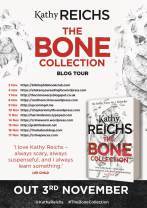 t’s been a while since I’ve read a Kathy Reichs book. I enjoy her series featuring forensic anthropologist Temperance Brennan but hadn’t read one of her recent novels, for no reason other than there is so much crime fiction out there. The Bone Collection is an excellent place to return to the series, however, not least because it’s a collection of short stories which can be read over successive evenings as I did.
t’s been a while since I’ve read a Kathy Reichs book. I enjoy her series featuring forensic anthropologist Temperance Brennan but hadn’t read one of her recent novels, for no reason other than there is so much crime fiction out there. The Bone Collection is an excellent place to return to the series, however, not least because it’s a collection of short stories which can be read over successive evenings as I did.
I find short stories difficult to review. They’re wonderful to read but it’s hard to identify the threads of a short piece of prose without giving too much of the plot away. I can say that this is a high-quality collection featuring Tempe in her professional capacity which will be a great attraction for fans of the series. In First Bones, we see the origins of Tempe’s decision to leave academia and become involved in criminal investigations. The other stories in the collection are set in locations as diverse as the Florida Everglades and Mount Everest. It was the latter setting that produced my favourite story of the book, Bones on Ice, because I love cold climates and the discovery of a frozen corpse is the perfect starting point for a mystery.
As you would expect from a Kathy Reichs book, the writing is accessible and the plots are gripping. For those new to Reichs’ books here would be a good place to start as the stories give a flavour of what to expect from a series that I’ll definitely be returning to.





